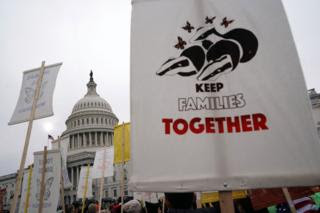The Trump organization has chosen to scratch off grants that permit almost 200,000 individuals from El Salvador to live and work in the US.
They were conceded Temporary Protected Status (TPS) after quakes shook the Central American nation in 2001.
Salvadoreans now have until 2019 to leave or face expulsion, unless they locate a legitimate method to remain.
The Trump organization has officially expelled TPS security from a huge number of Haitians and Nicaraguans.
Securities for Salvadoreans were set to terminate on Monday, after almost two many years of holding the philanthropic status because of the effect of the catastrophic event that killed more than 1,000 individuals.
The most recent declaration comes four months after the administration said it wanted to scrap an Obama-time conspire, Daca, that secured youthful undocumented workers, for the most part Latin Americans, from extradition.
Administrators in Congress have been given until March to choose the destiny of the 800,000 supposed Dreamers influenced by the Daca choice.
What does it mean for Salvadoreans in US?
Their insurance won't be ended until 9 September 2019 "to take into consideration a methodical progress", the Department of Homeland Security said in an announcement declaring the choice on Monday
"The first conditions caused by the 2001 quakes never again exist," the office said.
"In this way, under the material statute, the current TPS assignment must be ended."
Will's identity generally influenced?
The move will end the secured status of about 200,000 Salvadoreans living crosswise over America, constraining them to confront conceivable expelling or partition from their families.
It additionally brings up issues about the eventual fate of almost 200,000 of their youngsters who were conceived in the US, and who are likewise in danger of expulsion.
Salvadoreans with Temporary Protected Status are set up in vast numbers in California, Texas and around the US capital, Washington DC.
As indicated by the Center for Migration Studies, they speak to more than 135,000 family units the nation over, with a fourth of them mortgage holders:
》88% piece of the work constrain
》10% independently employed
》10% wedded to US subjects
What is Temporary Protected Status?
The program was made in 1990 and approves settlers from a few nations to live and work in the US legitimately, paying little mind to whether they entered the nation lawfully or not.
It is just allowed to nations influenced by furnished clash, natural catastrophe, or pestilences.
With about 200,000 foreigners in the US, El Salvador speaks to the biggest gathering of TPS beneficiaries.
Ten nations, making up more than 300,000 US foreigners, have been allowed TPS securities since it was first marked into law by President George Bush.
Uncommon security status for 59,000 Haitians and 5,300 Nicaraguans was ended before the end of last year, and furthermore produces results in 2019.
Salvadoreans are the biggest gathering by a wide margin to get TPS, after two tremors crushed groups the nation in March 2001.
Throughout the following 15 years, the program was re-approved by US presidents a few times.
What has response been?
Check Krikorian of the Center for Immigration Studies, hailed Monday's choice as a "long past due move".
"The possibility that there ought to be a 'brief status' that goes on for a long time is silly," he revealed to BBC News.
He trusted the TPS law ought to be rejected and supplanted with a procedure in which Congress would need to vote to re-approve brief migration securities.
The Salvadorean government has been campaigning the US to expand assurances for individuals from their nation living in the US.
El Salvador's Foreign Minister Hugo Martínez said his legislature would work with the Trump organization to locate a lasting answer for Salvadoreans working in the US.
Cash earned and sent back to families in El Salvador additionally makes a profitable commitment to the nation's economy, the Center for American Progress says. The research organization assesses that in 2015, settlements made up over 15% of El Salvador's GDP.
Democrats in Congress have censured the choice, with many scrutinizing the move for disregarding the savagery in El Salvador, which has one of the world's most elevated murder rates.
"A large number of families will stress over being torn separated as a result of this hard and nonsensical choice," Washington DC leader Murial Bowser said.
Nevada Senator Catherine Cortez Masto said it was "a strong update that we have a hostile to migrant president who walks out on persevering families and demands administering by dread and terrorizing".
Offices in the US are putting forth guidance to Salvadoreans.































